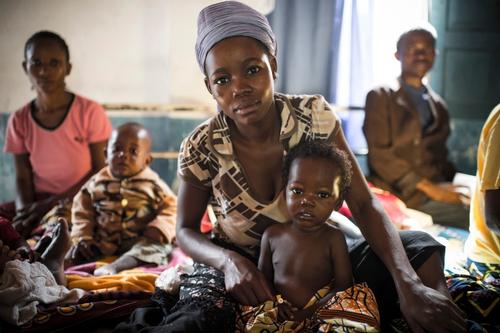MSF medic Dr Josine Blanksma worked in Baraka hospital in eastern Democratic Republic of Congo (DRC) for eight months. During her time there, Josine treated hundreds of patients for malaria, a parasitic infection that can be particularly fatal in children. Here she describes what it was like treating her young patients for the disease.
In the ward, the nurses are always busy: moving around, taking temperatures, checking the heart rates of the little ones, checking how they’re breathing, administering medications or putting in a drip when the children are too weak to swallow pills.
I go from bed to bed examining the patients. In children, malaria can rapidly become fatal, so it’s really important that we pay close attention to their symptoms. Are they breathing softly, or are showing signs of respiratory distress? Are they losing consciousness, or are they having seizures? At that point, a lot of red blood cells have been destroyed, and the brain and other organs are not getting enough oxygen. We bring the children immediately to the Intensive Care Unit (ICU), administer oxygen and give them blood if necessary. We’re working around the clock, doing everything we can to save children’s lives.
It is the peak of the malaria season in DRC. Every day, many patients are brought with severe malaria to us to the hospital.
Luckily, in most cases, we’re able to help them in time.
"Two days ago my son developed a fever. He’s been vomiting," a worried young mother tells me. She cradles her unconscious and very pale three-year-old boy in her arms.
We do a blood test right away. My suspicion is confirmed: the little boy has malaria. We medicate him through a drip, and he gets a blood transfusion as the malaria parasite has been attacking his red blood cells. We give him oxygen through a mask, and feed him therapeutic milk through a nasogastric tube. We have done everything in our power; now we must wait to see if his little body can defeat the disease. I’m afraid for his life.
When I wake up the next morning and go the hospital, the little boy is awake. His mother is feeding him porridge. Two days later he’s healthy again, and we can discharge him.
On another day, two children arrive at the hospital suffering from severe malaria. The five-year-old boy has been drifting in and out of consciousness, and the three-year-old girl is in a coma. I fear the worst. But my heart leaps for joy the next morning when I see them: the little girl is awake, looking at me with interest. The boy is sitting up in bed and is even eating again.
The malaria season was particularly bad this year, and our help makes all the difference for the families: there are many places in DRC where MSF is the only provider of free medical care. In DRC, my team and I provide lifesaving treatment to children like this little boy every day. As I know I’ll be an aunt soon, patient success stories like this touch me all the more.
Malaria is a tropical disease that is prevalent in Africa. It is caused by malaria parasites that are transmitted by the bite of a certain type of mosquito. Malaria parasites destroy the red blood cells that carry oxygen throughout the body. When left untreated, the condition becomes severe; patients become anaemic and their vital organs do not get enough oxygen. To treat malaria, MSF uses a combination therapy with an artemisinin base.
In 2012, MSF teams treated 1.6 million malaria patients worldwide.



